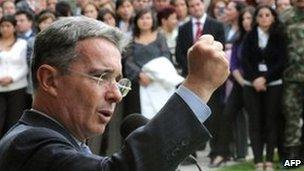Profile: Alvaro Uribe Velez
- Published

Alvaro Uribe is unlikely to fade from the political scene
Alvaro Uribe Velez is a tough conservative who has dominated Colombian politics for the past eight years.
His own political life has been dominated by the desire to rid the country of the rebels who killed his father during a botched kidnap attempt in 1983.
Mr Uribe won office in 2002, following it in 2006 with a landslide victory that gave him the four more years he said he needed to tackle Colombia's armed groups and drug-traffickers.
There was much speculation, never confirmed by Mr Uribe, that he would attempt to run for a third term.
However, this would have needed a change in the constitution.
In February 2010, the Colombian constitutional court ruled that this could not be put to a referendum, so signalling the countdown to the end of the Uribe presidency.
The military stepped up its fight against the rebels during the Uribe presidency
However, Mr Uribe is unlikely to fade from the political stage. His hard-line stance against the guerrillas who have waged a four decades-long war on the state has won him plaudits and he leaves office with high approval ratings.
He forced the rebels out of Colombia's towns and cities and back into the countryside, so bringing peace to the everyday lives of many Colombians.
Mr Uribe can point to a series of successes against the guerrillas, in particular the Revolutionary Armed Forces of Colombia (Farc).
Senior rebel commanders were killed and desertions from the rebel ranks rose.
On 2 July 2008, an audacious military operation tricked the rebels into handing over 15 of their highest profile hostages, including former presidential candidate Ingrid Betancourt.
Mr Uribe repeatedly said he would offer peace talks to the Farc, who still control rural areas, especially southern jungle regions, but only if they first lay down their weapons.
But although the Farc have suffered a series of blows, continuing attacks show they are not yet defeated and may well have rallied under new leadership.
Scandals
Mr Uribe can also point to success in tackling right-wing paramilitaries. In 2003, he negotiated a peace deal that saw paramilitary leaders surrender and demobilise 31,000 of their men in exchange for reduced jail terms and protection from extradition.
Human rights groups have argued that the government has been too lenient with the paramilitaries. Many received an amnesty despite committing abuses, including massacres, forced displacements and disappearances.
Mr Uribe was Washington's staunchest ally in Latin America.
Colombia is still the world's main producer of cocaine despite the government's attempts to eradicate drug crops, boosted by some $5bn (ВЈ2.5bn) in aid from the US through Plan Colombia.
But despite the close ties, a free trade agreement between Colombia and the US has long been delayed in the US Congress, where Democrats called for Mr Uribe's government to do more to tackle violence against trade union leaders.
Neighbours
The warm ties with the US were in stark contrast to the tense and often fractured relations with Venezuela during Mr Uribe's time in office.
They hit a new low on 21 July when Venezuelan President Hugo Chavez severed ties after Colombia accused Venezuela of being a haven for guerrillas - a charge he denied.
Ties with another neighbour, Ecuador, were also problematic.
Another issue that persisted during much of Mr Uribe's term in office is the "parapolitics" scandal.
Inquiries were opened into dozens of current or former members of congress over their alleged ties to the United Self-defence Forces of Colombia (AUC) paramilitaries.
Most of those being investigated were allies of President Uribe, including his cousin, Mario Uribe, although the president himself was not been implicated.
'No bitterness'
Mr Uribe's relations with the Farc go back to 1983, when they killed his father in the family ranch in Antioquia.
"I hold no bitterness," he said before being elected president for the first time. "I just want to serve Colombia."
The rebels tried to assassinate him several times. In April 2002, the guerrillas placed a bomb in a bus along the route Mr Uribe's campaign convoy was using in the Caribbean city of Barranquilla.
The bomb went off, but the armour of Mr Uribe's vehicle saved him from harm. Sixteen passers-by were not so lucky. Three were killed and 13 wounded in the blast.
Mr Uribe, born in July 1952, is a lawyer by training and was educated at Oxford and Harvard. He is married and has two sons.